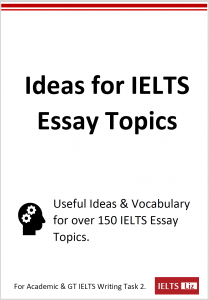Start your talk with confidence by paraphrasing your topic card in IELTS speaking part 2. This video lesson gives advice and tips about the best way to begin your part 2 talk with example paraphrasing techniques to demonstrate a good command of English to the examiner. Target band score 6 and above.
Recommended Lessons
IELTS Video Lesson: How to improve your IELTS speaking: click here
Topics for IELTS speaking part 2: click here
hello in this lesson I’m going to show
you
how to start your talk for IELTS speaking
part 2
now there is no right way all wrong way
to start your talk but I want to show
you a good way
to start and the topic we will use for
this lesson
is described a book you
recently read so let’s look at how to
start
here are to different ways to start
you could say I’d like to talk about
or I’m going to tell you about
now this one is a little bit more
formal and this one is less formal
but they are both fine the
IELTS Speaking test is not academic
it’s not formal so it’s okay to use
both of them you can also see here
that I’ve written I’d
and I’m so we don’t say
I would like to tell you about or
I am going to tell you about we say
I’d I’m and
this is to help you get a better band
score for your pronunciation
when you use the contraction I would
I’d this is better for your
pronunciation
now after this what
do you need to put well a lot of students
copy the words on that card and it’s not
very good to do that
if you want to get a band score
6 7 and above you need to show the
examiner
that you can use your own language
that you have flexible language
to paraphrase what is written on your
card
so it now let’s look at how we could
paraphrase that so here is one way
to paraphrase the information on the
card
I’d like to talk about a novel
which I read
two weeks ago so you can see that
the word book we paraphrased for the
word
novel now you need to
learn all the different types books
that you can’t read so was it a novel
was it fiction non-fiction was it a
guidebook
was it a self-help book so that’s
one way to paraphrase
take this word and be more accurate
what kind of book was it you can also
see here
I have put clause into the sentence
and that will help you get a higher band
score for your grammar and
here we’ve got two weeks ago
so instead of repeating the word
recently
we can give the time when
you did it two weeks ago 1 week ago
a month ago you can do that so that’s
a very nice way to paraphrase
and start your talk but we can improve
it
let’s have a look at one more and here’s
how we can improve
that start so you can see here that one
thing you can do
it give more information more
description
and we can use an adjective so here
I’ve used the adjective fascinating
which means really interesting
fascinating
you could also put useful
exciting you can describe
the book more and you can also see that
I’ve changed
this the paraphrase here and instead of
giving the information
I have given a paraphrase which is “not
so long ago” and that in a direct
paraphrase for recently
it’s very nice to use that and it
also means that during your talk
you can give more information about exactly
when you read the book and that’s
a way to
develop and extend your talk so I hope
you understand now
one way a good way to start your talk
well that’s all for this to happen I’ll
see you again
in another IELTS lesson





